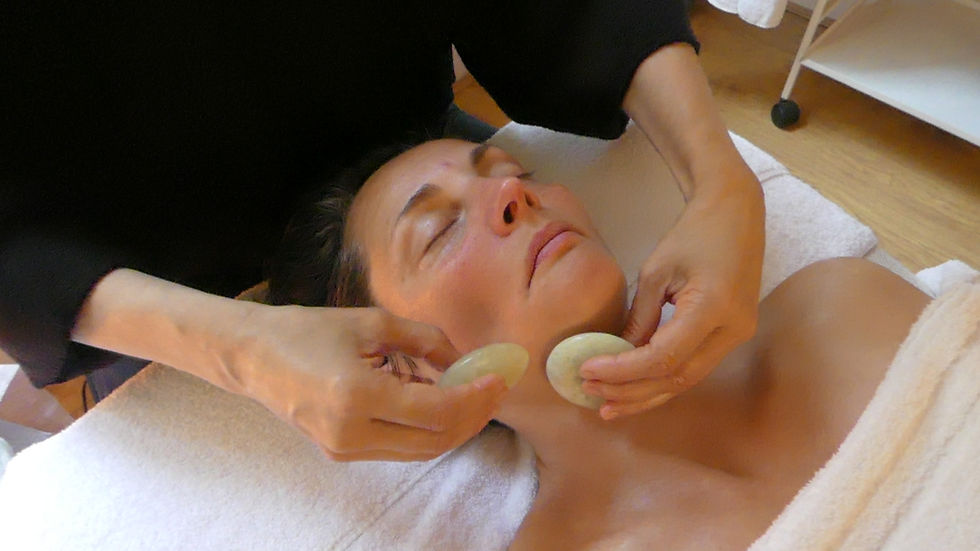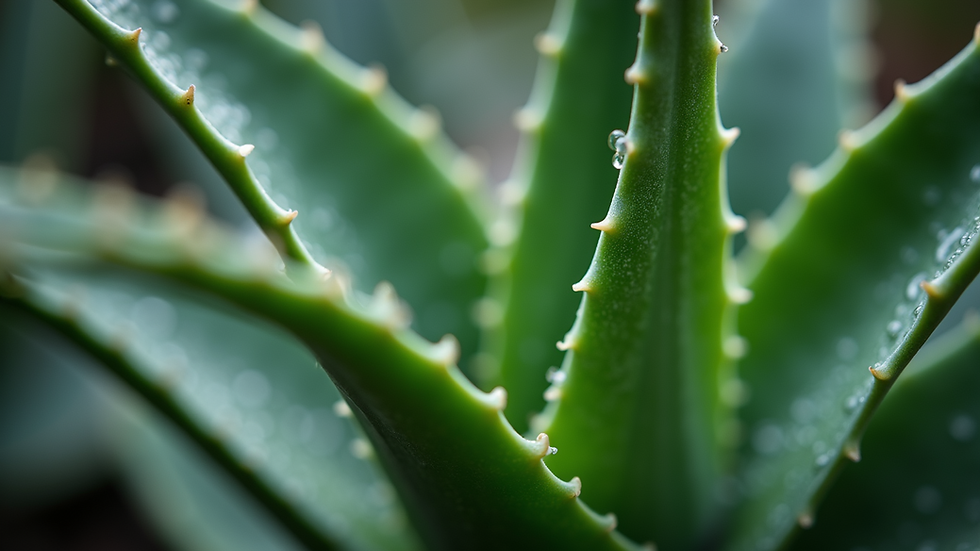Embracing Change: Your Journey to Healthy Skin During Menopause
- VERONICA MASSA

- May 28, 2025
- 4 min read
Menopause is a significant transition . While it marks the end of your reproductive years, it also introduces a variety of changes both inside and outside your body. One noticeable difference is how menopause affects your skin. With shifting hormone levels, many women experience drier skin, reduced elasticity, and increased blemishes. However, this phase does not mean you have to say goodbye to healthy, glowing skin. Instead, it offers an opportunity to enhance your skincare routine with effective natural solutions.
Understanding Skin Changes in Menopause
During menopause, significant hormonal changes occur, particularly a decline in estrogen levels. This reduction can lead to various skin alterations. Many women report thinner skin, increased wrinkles, and a loss of youthful fullness. For example, studies show that post-menopausal women experience up to 30% loss in skin collagen, drastically affecting skin elasticity. Additionally, you may face issues like dryness, irritation, and pigmentation changes. By understanding these skin changes, you can develop a strategy to maintain healthy skin during this transitional period and help restore vitality to your skin.
Discovering Your Path to Radiance
Menopause brings undeniable changes to your skin, but it is also an opportunity for rediscovery and self-care. By adopting natural solutions and essential skincare practices, you can maintain vibrant skin and foster a sense of empowerment during this transitional period. By committing to nourishing both your body, mind and skin, you can navigate this change with confidence.
Remember, the natural changes that come with menopause do not mean a decline in your skin’s health. They can signify a new chapter filled with opportunities for self-nurturing. Embrace this journey and enjoy the healthy, glowing skin that awaits you!

Embracing Self-Care Rituals
Self-care plays an essential role during menopause. Establishing a calming skincare routine tailored to your skin's specific needs can enhance both skin health and your overall mental wellbeing.
1. Gentle Cleansing
Opt for a gentle, hydrating cleanser that effectively removes impurities without stripping away moisture. Avoid harsh soaps that could worsen dryness and irritation. I use my Simplicity - Rose Cleansing Balm, which I designed for de-hydrated and sensitive skin. With Rosa Mosqueta & Rosa Damascena, Pomegranate - Orchid - Camelina - Cranberry. A deeply cleansing, decongesting Beauty Balm to regenerate, hydrate and nourish your skin.It soothes redness and inflammation and gives an all round revitalising lift for the ultimate healthy glow.
2. Regular Exfoliation
Exfoliating helps remove dead skin cells and promotes healthier skin. Choose gentle exfoliants with natural ingredients, such as oatmeal or clay. Nature offers a variety of clays all different in colour for specific skin types. I love to exfoliate with Moroccan rhassoul (or Ghassoul) clay, mixing it with a bit of honey makes a lovely hydrating face mask.. Aim to exfoliate once or twice a week to achieve smooth and refreshed skin without irritation.
3. Nighttime Moisture
Nighttime is when your skin repairs itself, making it the perfect time to apply a rich, nourishing oil. Look for products with peptides and antioxidants to support skin rejuvenation while you sleep.
4. Regular Facial Massage
Facial therapies and Facial Massage not only focus on the aesthetic aspect but also on a therapeutic level, on rebalancing body systems, emotions and energies. They stimulate the re-wakening of self awareness and open up to the correlation between facial expressions-emotions, muscle tightness-emotional/mental imbalances, in relation to premature ageing as well as stress related symptoms such as TMJ, headaches, eye strain (and sinusitis), while immersing into a deep state of relaxation.
Facial massage enhances the health and appearance of the skin. Assisted by the therapeutic use of botanicals for health & skincare and traditional techniques, they help enhance skin that looks dull, dehydrated, blemished and show signs of fatigue, bringing skin back to optimal condition, repairing existing damage and help it defend itself against premature aging.
Regular Self massage is also an important routine. This can be performed with your hands or Traditional Chinese medicine tools like Gua sha, Jade roller and Cupping. With cupping, improving blood circulation to the skin and gently stimulating fibroblast cells -which produce natural collagen and elastin - your skin will reveal a healthier glow. It also plumps up fine lines and and exfoliates the skin

Natural Skincare Ingredients for Menopausal Skin
1. Hyaluronic Acid
Hyaluronic acid is a key ingredient for hydration. This natural component can hold up to 1,000 times its weight in water, making it excellent for combating menopause-related dryness. Seek out serums or moisturizers that contain hyaluronic acid to enhance your skin's moisture retention, giving it a plump and youthful look. For example, many skincare brands offer serums with concentrations of around 1% to 2% hyaluronic acid for optimal results.
2. Essential Fatty Acids
Incorporating essential fatty acids into your diet can significantly benefit your skin. Foods rich in Omega-3 and Omega-6, such as fatty fish, walnuts, and flaxseeds, can strengthen your skin's lipid barrier, leading to improved hydration and fewer breakouts. For instance, consuming just two servings per week of fatty fish like salmon can increase your Omega-3 intake, positively influencing skin health. Additionally, consider using oils high in fatty acids, like avocado or argan oil, in your skincare routine for additional nourishment.
3. Aloe Vera
Aloe vera is famous for its soothing properties. It can be especially beneficial for menopausal skin. Studies have shown that aloe vera can reduce inflammation and enhance hydration. Applying pure aloe vera gel directly to your skin can relieve dryness and restore moisture levels. This natural remedy can be a simple yet effective addition to your skincare regimen.

Lifestyle Changes to Support Skin Health
1. Stay Hydrated
Staying hydrated is essential. Drinking enough water throughout the day helps maintain skin elasticity and hydration. Aim for at least eight glasses of water daily. I
2. Balanced Nutrient Intake
A balanced diet rich in vitamins and minerals supports skin health. Focus on foods that are high in vitamins A, C, and E, which are known to support skin renewal. Leafy greens, berries, nuts, and seeds are excellent sources of these vitamins. Incorporating just two servings of leafy greens daily can significantly increase nutrient intake, positively impacting your skin.
3. Sun Protection
As skin becomes thinner and more sensitive, sun protection is crucial. Use a broad-spectrum sunscreen with at least SPF 30 to prevent sun damage and pigmentation issues. There are more and more effective natural solutions in the market.








Comments